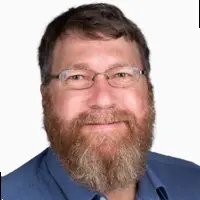
What inspired you to pursue a career in mining/science?
My grandparents were well-known natural history photographers who took me out on field trips with them when I was young. Through them, I developed a keen interest in ecology and the environment. I pursued this interest enthusiastically throughout my schooling school, culminating in a Master of Science in Zoology from The University of Western Australia (UWA).
After graduating, I was asked to help Western Mining undertake fauna monitoring for its rehabilitation sites at the Mt Magnet Gold Mine. This led to a full-time role with Western Mining at the Leinster Nickel Operation, where I developed an understanding of mining, environmental management, and rehabilitation. During this time, my interest in mine closure and rehabilitation deepened, and I carried this as a focus for the remainder of my career, most of which has been as a consultant supporting mining clients in developing mine closure plans and undertaking mine closure studies and investigations.
Throughout my career, I have continued to be inspired by nature and have felt comfortable that the roles I have held have contributed to continuous improvement and better outcomes for the environment.
Tell us about your current position?
I have recently moved from a full-time consulting role into a freelance role, in which I hold several casual contracts allowing me to manage a better work-life balance and ease myself, hopefully, into a comfortable retirement. Late in my career, I became a strong advocate for mine site repurposing and building opportunities and positive legacies for future generations. In my current role as a freelance consultant, I have chosen to focus my efforts on supporting post-mining stakeholders, including Indigenous corporations, technology developers and investors looking to repurpose mine sites. It is my belief that helping to raise awareness and capacity within post-mining stakeholders will again shift the paradigm of mine closure toward better and more sustainable outcomes.
Tell us about your involvement with CRC TiME. How and why did you become a partner?
I loosely became aware of and involved in the first attempt to get CRC TiME up and running. Following this, I had several discussions with Dr Guy Boggs, Professor Fiona Haslam Mackenzie and others who were instrumental in the successful second submission. As part of these discussions, I facilitated Golder Associates, who I was working for at the time to become a partner. This allowed me and others working at Golder (now WSP) to become actively involved.
Having a career-long interest and experience in mine closure, as well as being an advocate for repurposing and sustainable mine closure outcomes, I was very excited to join CRC TiME as a partner (through Golder). Many of the ideas, projects and discussions generated by CRC TiME were issues that I had been battling with for some time. CRC TiME now provides the forum and platform for industry, stakeholders, and regulators to come together to resolve these issues and develop a framework for mine closure that will carry us into the future.
How does being involved with CRC TiME help support your love of science?
Being involved with CRC TiME has meant that I now have a broader forum to share my ideas and issues with like-minded people. I am grateful that this forum includes representatives from all stakeholders, as well as from multiple disciplines. I learnt early in my career that such diversity is the key to unlocking mystery and uncertainty. It gives me great confidence that we are on the right path and that we will be successful.
Although my career has taken me through a great number of different roles and experiences, I have always been a scientist at heart. It is comforting to know that through CRC TiME, the aspirations and ideals of the young zoologist I used to be will benefit future generations.

